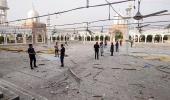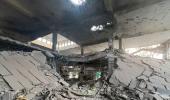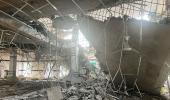'I am worried that Pakistan will still feel compelled to take substantive military action beyond this apparent drone activity.'
'If so, the crisis could persist for a while more and dangerous days are still ahead.'

"A full-scale war is very dangerous and costly. The question is how much farther we go with airstrikes and drones and missiles," Christopher Clary tells Rediff.
Mr Clary, a long-term observer of the India-Pakistan relaionship, is assistant professor of political science at the University at Albany, State University of New York. He is also a nonresident fellow with the South Asia programme at the Stimson Center in Washington, DC.
What are the 5 things that have most startled you about the current India-Pakistan hostilities?
I've been watching and researching India-Pakistan crises for more than twenty years, but I have been surprised by how much misinformation has taken over discussion of the crisis on social and traditional media.
Neither government has provided information quickly enough to dispel rumours.
While I do not believe this has seriously complicated crisis diplomacy yet, it has made it challenging for those watching the crisis in India, Pakistan, and abroad to understand what is truly happening.
I was surprised that India opted to strike Muridke and Bahawalpur. Both in the Punjabi heartland of Pakistan, these targets have been often discussed in recent decades.
Yet striking them, hitting Punjab from the air for the first time since 1971, was a surprise for me.
The post-May 7 drone activity has also been a surprise. The activity has been amplified by social media and misinformation, but images of air defenses going off at night make for good visuals and have dominated the airwaves accordingly.
This is expensive business since air defence missiles are not cheap and drones frequently are.
Relatedly, India and Pakistan have not had a meaningful air component of their conflicts since 1971. The 1999 war had an associated Indian air campaign on the Kargil heights but those were very far removed from population centres.
Western India though is full of towns and cities and people who are understandably worried about drones and air defences above their heads, as is similarly true for their Pakistani counterparts across the line.
I have been surprised that almost all the outside powers have encouraged restraint but they have done so mostly rhetorically.
The United States especially has played a more distant, more neutral role than I might have anticipated given its behaviour in past crises and its growing ties with India.
After Pakistani drones targeting Indian cities, you posted on X that the old rules have been thrown out, that the new rules have not been written and so we are in for a dangerous period.
Could you please explain for our readers what you mean?
It is simply the case that drones have not been used against the population centres of either rival by the other in the history of the rivalry.
Some of this is technological, but drones have operated for surveillance purposes along the border and the Line of Control for many years now.
To use them in this offensive role is new. Both sides will have to figure out what to do with these standoff capabilities that make it possible to strike and which are expensive, but not impossible, to defend against.

Unlike the 2016 surgical strikes and the 2019 Balakot air strike which ended rather quickly, this time it appears India is unwilling to get off the ramp so soon.
In your opinion, what is India trying to achieve by being resolute in its retaliatory responses?
While India came out of 2016 and 2019 feeling confident, Pakistan also felt positively after those crises believing that either India was exaggerating what had taken place or, in 2019, that Pakistan had given as good as it got on the military side of the ledger.
Modi would like to come out of this crisis with his brand intact as a defender of India but I think he also would like Pakistan to admit this was a costly crisis with a goal of changing troublesome Pakistani behaviour for many years rather than just a short period.

US Secretary of State Marco Rubio asked both Pakistan Prime Minister Shehbaz Sharif and India's External Affairs Minister S Jaishankar on Thursday evening to de-escalate immediately.
With President Trump and Vice President Vance shrugging their unwillingness to get involved in conflict resolution do you think India and Pakistan will even listen?
Is Saudi Arabia, which has some influence in both capitals, trying to get both sides to back off, like it did in 2019?
Is that why Saudi Arabia's Deputy Foreign Minister Adel al-Jubeir was in Delhi on Thursday?
Lots of outside powers, including the Saudis and the Iranians, have offered to help. I don't think either side lacks conduits for communication.
What remains to be seen is if any outside power is willing to pull on economic or other levers to make de-escalation more attractive for one or both sides.
Both sides want to restore deterrence and that's a tricky thing to accomplish simultaneously.

Is the Trump administration's unwillingness to direct some kind of resolution part of its no war charter, or with all the wounds DOGE has inflicted at the State Department, it lacks the expertise and personnel to intervene effectively?
The Trump administration is tired of having to do crisis diplomacy with Israel and its neighbors, with Ukraine and Russia, and with Iran.
I think it's occupied elsewhere. The fact that the transition was only a few months ago has also contributed since there are fewer senior officials than there might be if the administration was later in its term.
Is a conventional war still possible? Do you think the Pakistan army will back down from a military confrontation for fear that the war will decimate the country economically?
I think a full-scale war is very dangerous and costly and neither side desires it. The question is how much farther we go with airstrikes and drones and missiles.
Additionally the fighting along the Line of Control is intense and limited landgrabs in Kashmir are not impossible to imagine if this crisis worsens.

As an astute observer of the Pakistan army, how would you explain the military's desire to provoke India with that horrific terrorist action in Pahalgam by its proxies?
What would Asim Munir and his military hope to achieve?
Proxy wars are tricky things. People lie about supporting proxies and so it's hard to infer motives. One possibility is Pakistani military officials didn't know about the planned attack.
Or perhaps Pakistan knew vaguely but didn't realise the attack would be so deadly. Still another possibility is Pakistan knew, of course.
If Pakistan knew, what might have been their motives? Pakistan alleges that India is engaged in a proxy war in Pakistan -- supporting the Baloch Liberation Army and Tehrek-e-Taliban Pakistan.
India says that is ludicrous. If Pakistan is sincere in its belief of Indian involvement in anti-Pakistan insurgencies, then perhaps more attacks in Kashmir could be a response to the worsening situation in Balochistan.
But as I said these are very tricky things to discuss with any confidence.

Is de-escalation of the situation some distance away? What will it take for both sides to de-escalate?
It is not impossible the situation will de-escalate quickly. I am worried that Pakistan will still feel compelled to take substantive military action beyond this apparent drone activity.
If so, the crisis could persist for a while more and dangerous days are still ahead.
Feature Presentation: Aslam Hunani/Rediff.com










